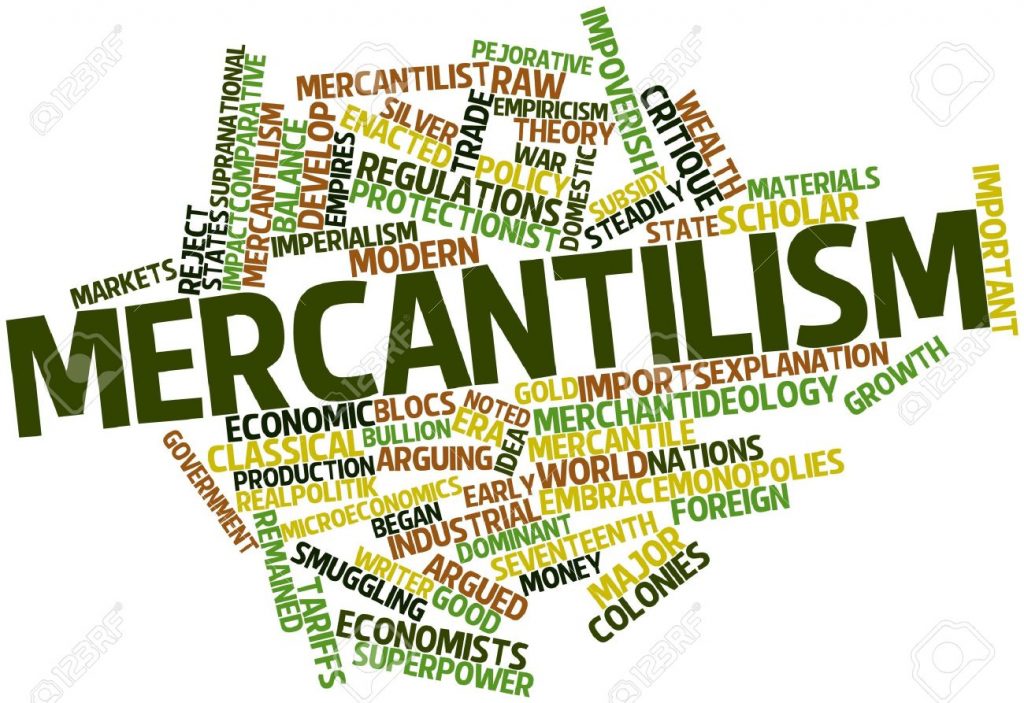Mercantilism is one of the most influential economic doctrines in the history of economics; however, the school that dominated European thought for two centuries is now considered a historical artifact. According to scholar Lars Magnusson, no self-respecting economist would associate himself or herself with mercantilism in today’s society.1

Mercantilism was the dominant economic policy most associated with the Early Modern period of the 16th and 17th centuries. During this era, the only true measure of a country’s wealth and success was thought to be the amount of gold and silver reserves that a nation possessed. In order to add precious metals to a nation’s reserves, it would seek to maximize its net exports and minimize its imports in order to secure its prosperity. Countries that had more wealth could in turn raise and maintain stronger armies and navies, and thus be more powerful. Moreover, according to the doctrine of mercantilism, the gold and silver reserves in the world were thought to be limited. Therefore, one’s gain in precious metals would come at some other country’s expense. Trade was a zero-sum game. For example, the gain from trade for England, mercantilism taught, would be a loss for France or Spain. The best way to ensure a nation’s prosperity was by limiting imports and increasing exports, thereby generating a net inflow of gold and silver, thus increasing the country’s overall gold stocks. Every European nation was trying to find a market for its exports to bring wealth while limiting imports, which would otherwise transfer wealth to others.2
Mercantilism was an economic theory that placed the nation, not the individual, at the center of economic activity. Economic nationalism, the effort to boost exports, was seen as a state-sponsored endeavor. States backed domestic production. Governments applied many forms of protectionist policies in order to promote efficient domestic consumption and maximize the export of surplus production. According to the famous British Navigation Act of 1651, all imports to England had to be carried to English ports on English ships. Colonial exports to Europe had to first land at an English port before going any further. These laws sharply restricted colonial trade with anyone else but England. With mercantilism, each country sought to export as much as possible while preventing imports. As a result, the economic importance of colonies to the success of colonizing powers became vital.3
According to the famous British Navigation Act of 1651, all imports to England had to be carried to English ports on English ships. Colonial exports to Europe had to first land at an English port before going any further. These laws sharply restricted colonial trade with anyone else but England. With mercantilism, each country sought to export as much as possible while preventing imports. As a result, the economic importance of colonies to the success of colonizing powers became vital.3

Colonies played a critical role for European countries. Each country sought to become self-sufficient so that they would not need to import goods from the other European powers. Colonies provided the precious metals and raw materials that European countries needed but could not produce at home. They were also markets for finished goods. According to mercantilism, colonies could only trade with their mother nation, and the direction of wealth should flow to the mother nation. In order to protect colonial trade, each European nation developed powerful navies, which protected its nation’s trade routes.4
The collapse of mercantilist ideology can be attributed to Adam Smith’s classic book The Wealth of Nations. Smith argued that the wealth of a nation does not consist in the amount of gold or silver stashed in its treasuries, but in the productivity of its workforce. He stated that trade can be mutually beneficial for nations, and that the general growth of wealth did not come at the expense of others, but that a “rising tide” of growth would benefit all, which is directly opposed to the ideology of mercantilism.5
- Lars Magnusson, Mercantilism: the shaping of an economic language (London: Routledge, 1994), 8. ↵
- John Maynard Keynes, The general theory of employment, interest and money (New York: Harcourt, Brace and Co., 1936), 3. ↵
- Alan Brinkley, American History: Connecting with the Past Volume 2, 15 edition (New York: McGraw-Hill Education, 2014), 26-27. ↵
- The Concise Encyclopedia of Economics, 2008, s.v. “Mercantilism,” by Laura LaHaye. ↵
- The Concise Encyclopedia of Economics, 2008, s.v. “Mercantilism,” by Laura LaHaye. ↵



85 comments
Eugenio Gonzalez
The article is well-written and presents interesting information. A compelling narrative that keeps you interested in the concepts of mercantilism and how countries put it into practice. The author uses excellent images that help the reader understand the idea of mercantilism. Nice use of primary sources and scholarship on the topic. Overall, the author does a fantastic job presenting information that the reader can easily understand.
Vianey Centeno
The concept of mercantilism was clearly explained in this article. Particularly in light of the fact that colonies were only permitted to trade with their home nation, the depth of mercantilism is quite fascinating. It’s a bit odd that mercantilism, which was so effective for such a long time, was supplanted by other economic systems like capitalism. I appreciate you creating this content.
Elena Montiel
I enjoyed this article because it shows how they affected everyone around by limiting imports and pulling from different supplies. I also enjoyed that it showed how one person changed it. It was well written and I’m glad to know that once someone looks at it from an outside perspective, everyone can benefit. It also gave a clear overview of what mercantilism was before explaining its effects. Nice work.
Shane
This article has a lot of information on mercantalisim and what was used for trading back in the day and the true value of trading itself. Gold and silver were big in trade and was very sought after for its value and uses some of these trades affected other countries negatively as well which they didn’t like I also like the fact the ideology of mercantilisim is mentioned and the way its explained is well Said and how a country’s wealth isn’t measured by materials rather than how hard they work in the area
Brandon Vasquez
This article was written really well and allows for the reader to understand what mercantilism is and what it meant to countries in the 17th through 19th centuries. This article also shows how the ideology of mercantilism was replaced and a nation’s wealth was not based on how much gold and silver it had but ultimately on how productive the nations workforce was.
Vanessa Preciado
This article provided a great detailed perspective of mercantilism in the colonial period. He analyzed how outdated their practices were, and stated how Adam Smith contributed to the collapse of mercantilism. I also like the depiction of the relationship between the colonies and England. Showing how the colonies serve the Queen ( England ) as maids.Representing the colonies as inferior to England. Nice work, and the images really amazed me, particularly the first one.
Franchesca Tinacba
I think this article was well written! I believe this article is easy to understand for anyone wanting to learn U.S. History. Many people may not understand the true definition of mercantilism, so I think this article highlights the important facts and information about this topic. I also think this article is a good piece to read about because mercantilism was a huge theory that many countries followed back then since it dealt with wealth and power. Thank you for publishing this.
Ryan Romine
This is a great article about the early thoughts of Mercantilism. It is crazy how at one point in time it was thought that Gold and Silver are the only way a country can be rich. However, in today’s world countries are still trade and trying to have higher exports than imports to create positive trade within their country.
Kimberly Rivera
This article was a breeze to read and it allowed me to not only learn the basic definition of mercantilism but see how it worked and why it began. It not only expanded the explanation but also made it easier and interesting to understand. I also found the ending nice as it ended the article with how mercantilism came to an end and how Adam Smith contributed to it with his book.
David Kamel
I love this article. For starters I think your use of images is great, I think your writing style is engaging and that your sources are well formatted. I will say I did not expect to get that much out of the article but I’m glad that I was pleasantly surprised with great wording and imagery and overall I love it!